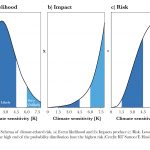 September 27, 2018 9:56 am
Published by Jenny Rislund
September 27, 2018 9:56 am
Published by Jenny Rislund
The Central American mid‐summer drought (MSD) is the decline in rainfall during the middle of the wet season over Central America, which has been shown to have strong effects on agriculture and bushfires in Costa Rica. The Madden–Julian oscillation (MJO) has been shown to influence Costa Rican rainfall on intra‐seasonal time scales, and therefore may be important to the MSD. This research aims to find the connection between the MJO and MSD.
 September 25, 2018 11:20 am
Published by Jenny Rislund
September 25, 2018 11:20 am
Published by Jenny Rislund
Heat waves are the deadliest natural hazard in Australia. Motivated by the prediction that the number of extremely hot days in subtropical Australia will increase in a warmer climate, this study aims to develop a comprehensive picture of the processes leading to extreme temperatures.
 September 11, 2018 1:07 pm
Published by Jenny Rislund
September 11, 2018 1:07 pm
Published by Jenny Rislund
This paper shows that many models overestimate the interaction between hot and dry conditions in wet regions and therefore overamplify heat extremes. The study points to necessary model improvement to increase confidence in future projections of heat extremes.
 August 23, 2018 2:34 pm
Published by Jenny Rislund
August 23, 2018 2:34 pm
Published by Jenny Rislund
This paper examined the likelihood of extreme marine heatwaves global using climate models simulations, with and without anthropogenic influences, concluding that these events were up to fifty times more likely due to anthropogenic climate change.
 August 21, 2018 10:55 am
Published by Climate Extremes
August 21, 2018 10:55 am
Published by Climate Extremes
This report is not intended as a “science paper”, rather its designed to translate science into action and highlight risks in the way businesses, the military and emergency services should treat risk when it becomes existential.
 August 15, 2018 12:12 pm
Published by Climate Extremes
August 15, 2018 12:12 pm
Published by Climate Extremes
The study finds important regional consequences for precipitation and clouds formation if large changes in dimethyl-sulfide emissions were to occur. In a hypothetical case where all marine DMS emissions cease completely, we find the Earth would warm by approximately 0.5 degrees C over a ten-year period.
 August 15, 2018 10:43 am
Published by Climate Extremes
August 15, 2018 10:43 am
Published by Climate Extremes
CLEX researchers found that counter-clockwise rotating eddies in the Southern Ocean mix the ocean deeper in winter, allowing more nutrients to enter their interiors, leading to higher productivity. This work is important because eddy productivity plays a significant role in the exchange of carbon between the ocean and the atmosphere.
 August 14, 2018 11:33 pm
Published by Climate Extremes
August 14, 2018 11:33 pm
Published by Climate Extremes
This research demonstrates how cloud processes, steep mountains, tropical coastlines, the daily changes in solar insolation and planetary-scale waves work together to cause large variations in the tropical heating that drives global circulation patterns. Many of these effects are under-represented in global climate models.
 August 14, 2018 8:56 pm
Published by Climate Extremes
August 14, 2018 8:56 pm
Published by Climate Extremes
The MAAT framework can be used to systematically run multiple model simulations to explore how different underlying model assumptions, hypotheses and parameters lead to predicted model behaviour and isolate the causes of model divergence.
 August 14, 2018 12:08 pm
Published by Climate Extremes
August 14, 2018 12:08 pm
Published by Climate Extremes
The ARC Centre of Excellence Undergraduate Summer Scholarships in Climate Extremes are highly competitive scholarships intended to provide undergraduate students from Australian universities an introduction to cutting-edge climate science research at one of our five universities, or our national partners- CSIRO, Bureau of Meteorology and Department of Environment.










